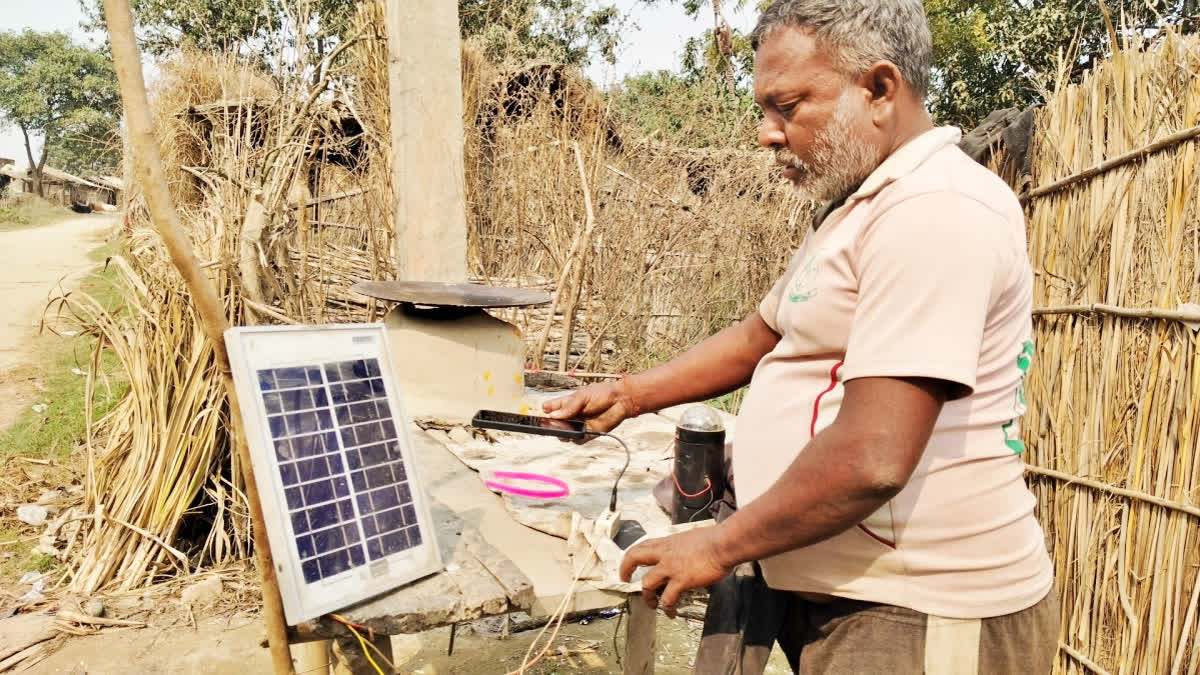Bagaha: In Jhandua Tola, a village in Bihar's Bagaha district, residents like Mahendra Ram travel approximately one kilometre daily to Susta village in Nepal to charge their mobile phones due to the absence of electricity in their village. This routine has persisted for several years, affecting nearly every mobile phone user in the community.
Despite initiatives to digitise India, Jhandua Tola remains without power, raising questions about the reach of such programmes. ETV Bharat correspondent Dilip observed villagers heading towards Nepal for mobile charging. Residents emphasised the essential role of mobile phones for communication and expressed frustration over the lack of electricity in their village.
"There is a 24-hour power supply in Nepal, just one kilometre from here. If we need to charge our mobile phones, we have to go to Susta village in Nepal. There is always electricity there. Electricity has not come to our village till date," explained Mahendra Ram, a resident of Jhandua Tola.
The absence of electricity not only hampers communication but also poses safety concerns. Villager Sukhal Ram noted that children are unable to study at night due to darkness. Additionally, the proximity to forest areas poses a threat to villagers from wildlife, including tigers, leopards, wild boars, rhinoceroses, and snakes. "Tigers have so far killed five goats belonging to three people in the village. These wild animals enter the village, and we spend our nights in terror and darkness," he said.
Jhandua Tola, along with neighbouring villages Bean Toli and Chakdahva, is located on the Indo-Nepal border in West Champaran, Bihar. Collectively, these villages are home to over 200 families, who have never had access to electricity. A solar plant provided some relief for about a year, but it has been non-functional for the past three years.
The issue extends beyond Bagaha; approximately 25 villages in the Don area under Ramnagar block also lack electricity. These include Aurahiya, Champapur, Semrahni, Sherwa, Narkatiya, Gobarhiya, Bhuliharwa Tola, Gardi, Lachminiya Tola, and Raghiya, all situated between the Valmiki Tiger Reserve forest and mountain rivers.
Phoolkumari Devi, a 70-year-old resident of Jhandua Tola, recounted, "I am 70 years old. In this time, we saw houses lit up with electricity only for one year. Now, for the last three years, we are forced to spend the nights in darkness and fear."
The lack of electricity has also deprived villagers of modern amenities. "Electricity supply comes to Bhedihari, three kilometres away from our village. People there use TV, fridge, fan, etc., but we have not even seen them. We have only heard from people what they are used for," said Phoolkumari Devi.
Asha Devi, another resident, added, "When electricity came to the village from the solar plant, we were very happy, but after a year, our happiness disappeared. Now, dinner has to be cooked in daylight, or if it is not cooked due to some reason, then we have to spend the night hungry."
Former Block Development Committee member Gulab Ansari highlighted that after much effort, a solar plant was established four years ago, but it became defunct after just one year. "After independence, people saw electricity for only one year. Whenever we complained about this to the administration, we were only given assurances that permanent electricity supply would be restored soon," he stated.
Efforts are underway to address the issue. A power grid is planned for these villages at Rs 139 crore, with electricity to be supplied through both offline and online mediums. The tender process has commenced, and on a recent visit to Ghotwa Tola in Bagaha, the Chief Minister laid the foundation stone for the project. Executive Engineer of the Electricity Department, Alok Amritanshu, mentioned that visible work is expected to begin within two months.
"The state government has planned to build an on-grid and off-grid power station at a cost of Rs 139 crore. Once this plan is implemented, a 24-hour power supply will be ensured in the area," Amritanshu stated.
The delay in electrification is attributed to the village's location along the Gandak River and its proximity to dense forests, which have posed challenges for infrastructure development. While efforts to establish a power grid have now begun, residents of Jhandua Tola and surrounding villages continue to live without basic amenities. Observing the development in nearby Susta, Nepal, villagers often question when they will receive similar benefits.
"We see the lights across the border and wonder when our village will have the same. It's disheartening," expressed a local resident.
The community remains hopeful that the ongoing projects will soon bring much-needed electricity to their homes, improving safety, education, and overall quality of life.
Read more: Neck-Deep In Poverty, Gaya Man Gives 16 Years Of Life To Dig Ponds As Water Crisis Hit Bihar Village



